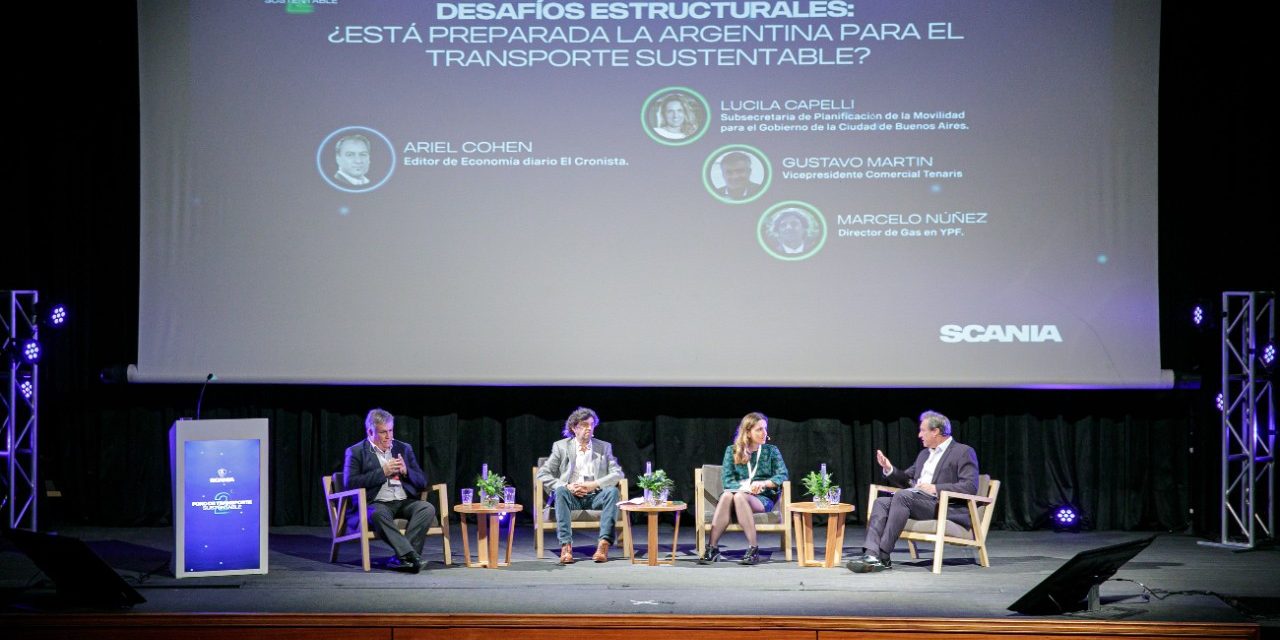During one of the panels of the 2nd Sustainable Transport Forum organized by Scania Argentina, and under the premise of talking about “Structural challenges: is Argentina prepared for sustainable transport?” the importance of sustainable mobility and expanding the natural gas network to propose a new scheme for urban and cargo carriers. Marcelo Núñez, Director of Gas at YPF, detailed the gigantic project on which the state-owned company is working, which includes the construction of five trunk corridors to supply fast refueling to CNG-powered cargo vehicles.
“Today Argentina has saturated gas pipelines. If we wanted to use CNG more, we would have to have more gas pipelines and expand distribution. In this race to give value to Vaca Muerta, it is key to favoring the reduction of the carbon footprint and generating foreign exchange, since US$2,000 million are spent annually on imports. If we want CNG to stop being a second-rate fuel, if we want carriers to want to have CNG trucks, we are in a position to announce a major national YPF project to create five national corridors with large fast-fill stations -with maximum refueling time of 8 minutes – and no more than 300 kilometers between points for cargo transport,” said Núñez.
He said that with this “the logistics, resale value and supply model are changed, so that it closes the equation for everyone. We want you to help us identify the barriers and solve them. With the YPF freight transport model, which will begin with bases in Añelo and Zárate and from there extend this corridor project of the national sustainable transport program, we will change that equation. I can anticipate that one of those corridors will be Buenos Aires-Rosario-Córdoba, with high-flow pumps, with refueling of LNG, CNG and other fuels. This will lead to challenge companies like Scania to have more natural gas trucks available. Regarding public passenger transport, we have identified that in medium and large cities it is necessary to develop YPF refueling stations at transport hubs.”
For her part, Lucila Capelli, Undersecretary of Mobility Planning of the Government of the City of Buenos Aires, assured that the mobility policy of the last decade always had public transport and active mobility as a priority. She highlighted as a general objective a vision of low-emission vehicles for last mile missions.
“We have been working for years on sustainable mobility, it is a cultural change and it is a very important public policy. The pandemic greatly reduced the number of passengers traveling. Telecommuting has a major impact and the other mantra of transport and climate change is to improve technologies. We tested electric, CNG and biofuel vehicles, among others, in the city,” she pointed out.
Meanwhile, Gustavo Martín, VP Commercial Southern Cone at Tenaris, stated: “Tenaris is committed to reducing emissions. We have gas, but we cannot have it because the transportation capacity is saturated. The Néstor Kirchner trunk gas pipeline is going to increase trunk gas transportation by 30%. Behind this a lot of necessary derivation works appeared. The first stage of the gas pipeline is expected should be ready by mid-2023, it is a big challenge. For many years our country has had a large amount of CNG light transport, which is 12%, a very large number compared to other countries, but in heavy transport there is a huge challenge. With the network that YPF recently announced, there is enormous hope.”
“The first place where we should test CNG transportation is in the AMBA [City of Buenos Aires and Greater Buenos Aires], because of the filling stations and the infrastructure it has. In LNG this is not easy to solve. There is a window of opportunity. The advances in Scania both in cargo and passengers transport, and what YPF does, are very great. We are optimistic about that because there is a general consensus about the opportunities,” Núñez added.
Source: Scania Argentina







